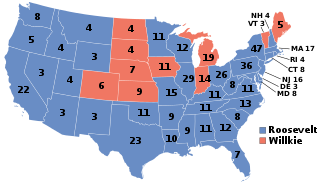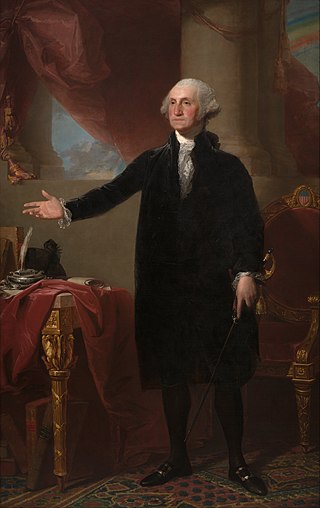
The 1940 United States presidential election was the 39th quadrennial presidential election. It was held on Tuesday, November 5, 1940. Incumbent Democratic President Franklin D. Roosevelt defeated Republican businessman Wendell Willkie to be reelected for an unprecedented third term in office. Until 1988, this was the last time in which the incumbent's party won three consecutive presidential elections. It was also the fourth presidential election in which both major party candidates were registered in the same home state; the others have been in 1860, 1904, 1920, 1944, and 2016.

The New Hampshire presidential primary is the first in a series of nationwide party primary elections and the second party contest, the first being the Iowa caucuses, held in the United States every four years as part of the process of choosing the delegates to the Democratic and Republican national conventions which choose the party nominees for the presidential elections to be held in November. Although only a few delegates are chosen in the New Hampshire primary, its real importance comes from the massive media coverage it receives, along with the first caucus in Iowa.

In the United States, the presidential library system is a nationwide network of 16 libraries administered by the Office of Presidential Libraries, which is part of the National Archives and Records Administration (NARA). These are repositories for preserving and making available the papers, records, collections and other historical materials of every president of the United States since Herbert Hoover, the 31st president from 1929–1933. In addition to the library services, museum exhibitions concerning the presidency are displayed.
In United States politics, balancing the ticket is a practice where a political candidate chooses a running mate, usually from the same party, with the goal of bringing more widespread appeal to the campaign. The term is most prominently used to describe the selection of the U.S. vice presidential nominee.

In political studies, surveys have been conducted in order to construct historical rankings of the success of the presidents of the United States. Ranking systems are usually based on surveys of academic historians and political scientists or popular opinion. The scholarly rankings focus on presidential achievements, leadership qualities, failures and faults. Popular-opinion polls typically focus on recent or well-known presidents.

A speechwriter is a person who is hired to prepare and write speeches that will be delivered by another person. Speechwriters are employed by many senior-level elected officials and executives in the government and private sectors. They can also be employed to write for weddings and other social occasions.

The Democratic Party is one of the two major political parties of the United States political system and the oldest active political party in the country as well as in the world. The Democratic party was founded in 1828. It is also the oldest active voter-based political party in the world. The party has changed significantly during its nearly two centuries of existence. Once known as the party of the "common man," the early Democratic Party stood for individual rights and state sovereignty, and opposed banks and high tariffs. In the first decades of its existence, from 1832 to the mid-1850s, under Presidents Andrew Jackson, Martin Van Buren, and James K. Polk, the Democrats usually bested the opposition Whig Party by narrow margins.

Beginning with painter Gilbert Stuart's portrait of George Washington, it has been tradition for the president of the United States to have an official portrait taken during their time in office, most commonly an oil painting. This tradition has continued to modern times, although since the adoption of photography as a widely used and reliable technology, the official portrait may also be a photograph.

Gallup was the first polling organization to conduct accurate opinion polling for United States presidential elections. Gallup polling has often been accurate in predicting the outcome of presidential elections and the margin of victory for the winner. However, it missed some close elections: 1948, 1976 and 2004, the popular vote in 2000, and the likely-voter numbers in 2012. The month section in the tables represents the month in which the opinion poll was conducted. D represents the Democratic Party, and R represents the Republican Party. Third parties, such as the Dixiecrats and the Reform Party, were included in some polls.
Polish-Americans in the United States comprise a voting bloc sought after by both the Democratic and Republican parties as they have a bellwether status. Polish Americans comprise 3.2% of the United States population, but were estimated at nearly 10% of the overall electorate as of 2012. The Polish-American population is concentrated in several Midwestern swing states that make issues important to Polish-Americans more likely to be heard by presidential candidates. According to John Kromkowski, a Catholic University professor of political science, Polish-Americans make up an "almost archetypical swing vote". The Piast Institute found that Polish Americans are 36% Democrats, 33% Independents, and 26% are Republicans as of 2008. Ideologically, they were categorized as being in the more conservative wing of the Democratic Party, and demonstrated a much stronger inclination for third-party candidates in presidential elections than the American public.

The 2016 United States presidential election in California was held on Tuesday, November 8, 2016, as part of the 2016 United States presidential election in which all 50 states plus the District of Columbia participated. California voters chose electors to represent them in the Electoral College via a popular vote, pitting the Republican Party's nominee, businessman Donald Trump, and running mate Indiana Governor Mike Pence against Democratic Party nominee, former Secretary of State Hillary Clinton, and her running mate Virginia Senator Tim Kaine. California had 55 electoral votes in the Electoral College, the most of any state.









